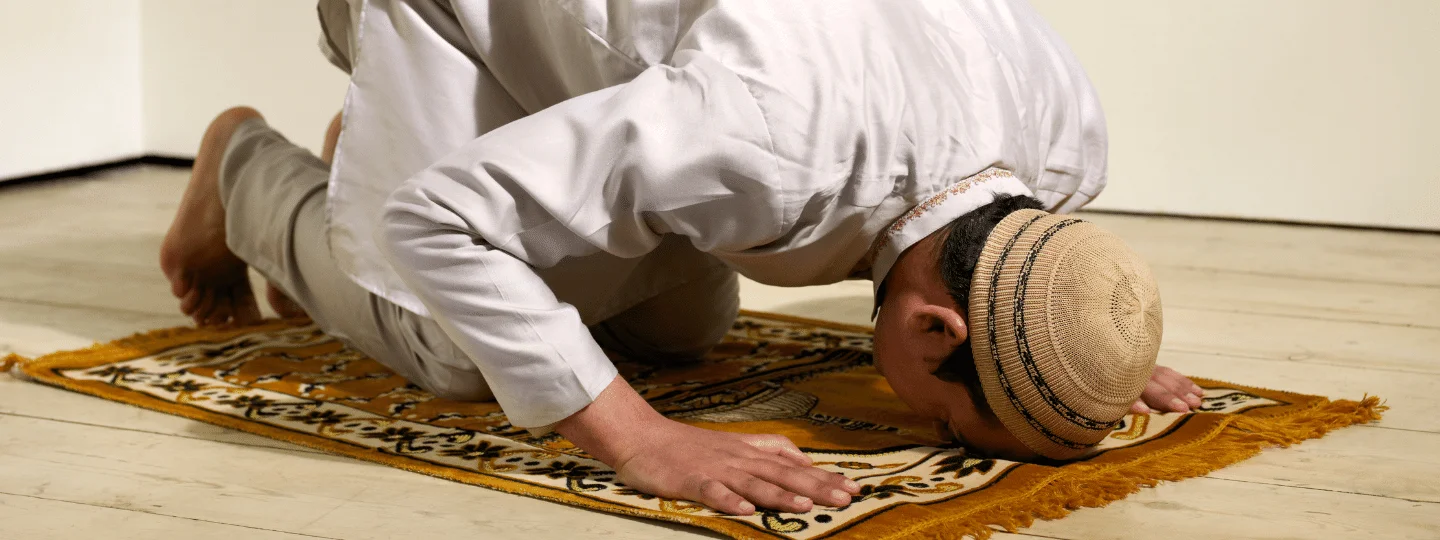Is it permitted to pray Jummah or Eid Salah at home in the Hanafi Madhab?
Quran
Hadith
Islamic Text
This will not be valid unless the condition of Al-Idhin Al-Aam (الْإِذْنُ الْعَامُّ – public access) and public announcement has been fulfilled. Without opening up one’s house to the public and allowing anybody to walk in and attend the prayer, Salat al-Eid and Jumu’ah will be invalid.
It is clear in the Hanafi books that the conditions of Jumu’ah and Eid Salah are the same with the exception of Khutbah. The Khutbah is a condition for Jumu’ah and it is recommended (Sunnah) for Eid. One of the conditions for both is Al-Idhin Al-Aam which is to have public access. Imam Ibn al-Humam mentioned this explicitly in Fath Al-Qadeer:
وَلَمَّا اشْتَرَكَتْ صَلَاةُ الْعِيدِ وَالْجُمُعَةُ فِي الشُّرُوطِ حَتَّى الْإِذْنِ الْعَامِّ إلَّا الْخُطْبَةَ لَمْ تَجِبْ صَلَاةُ الْعِيدِ
“Salat al-Eid and Salat al-Jummah share the same conditions including Al-Idhin Al-Aam (public access), however, Khutbah is not required for the validity of Eid.” – Ibn al-Humam, Fath Al-Qadeer, Vol. 2, p70
There are some Fatwas going around saying that a person can pray at home with his doors closed and this would be valid according to the Hanafi Madhab. They try to get around the aspect of Al-Idhin Al-Aam being fulfilled by saying if somebody was to knock on his door then he would allow them in to pray Eid, this would fulfil the condition even if he had made no announcement with regards to the Eid Salah being prayed in his house. In another Fatwa, it says that as long as he has at least one outsider praying Jumu’ah in his house, this fulfils the criteria of Al-Idhin Al-Aam.
Unfortunately, neither of the two Fatwa provided any references from authoritative books of Hanafi Fiqh to substantiate their understanding of Al-Idhin Al-Aam. Rather, when we look at the explanation mentioned in the Hanafi books, it contradicts what is being mentioned in these Fatwas. The classical Hanafi texts explain Al-Idhin Al-Aam as Al-Ishtihaar (الِاشْتِهَار) meaning public announcement. So we understand from this that not only must there be public access to wherever Jumu’ah and Eid Salah is being prayed but this must be well-known as well, via public announcement.
For example, Imam Ibn Nujaym in Al Bahr Al Raiq explained:
قَوْلُهُ وَالْإِذْنُ الْعَامُّ) أَيْ شَرْطُ صِحَّتِهَا الْأَدَاءُ عَلَى سَبِيلِ الِاشْتِهَارِ)
“Al-Idhin Al-Aam means that from the conditions of the validity of the prayer is, it must be prayed after being publicly announced.” – Ibn Nujaym, Al Bahr Al Raiq, Vol. 2, p162
When explaining Al-Idhin Al-Aam, Imam al–Shurunbulali in Maraqi al-Falah said:
فلزم إقامتها على سبيل الاشتهار والعموم حتى غلق الإمام باب قصره أو المحل الذي يصلي فيه بأصحابه لم يجز
“It is required to establish it after it being publicly announced and it must be open to all, such that if the Imam prays in his palace or anywhere else where he prays with his companions, it is not valid.” – Al–Shurunbulali, Maraqi al-Falah, Vol. 1, p194
Imam Muhammad Shaybani explained in Al-Jami al-Saghir:
الْأَدَاء على سَبِيل الاشتهار شَرط حَتَّى لَو أغلق الْأَمِير أبوب الْحصن وَصلى بِالنَّاسِ وَعَسْكَره لَا يجوز
“It must be performed after public announcement such that if the Amir (governor) closes the doors of his fortress and prays with the people there and his army, it is not valid.” – Muhammad al-Shaybani, Al-Jami al-Saghir, Vol. 1, p111
This point is mentioned in many other Hanafi books too and it is clear that Al-Idhin Al-Aam is understood to mean public knowledge via public announcement. It cannot be understood to mean praying in your house and if somebody happens to knock the door, you open the door. This is not found anywhere and is in direct contradiction with what is found in the Hanafi books. Nor does it mean that you can have just one person from outside your family praying with you and that would establish Al-Idhin Al-Aam. None of these come under the correct definition of Al-Idhin Al-Aam.
Another problem arises from these Fatwas and is probably an unintended consequence of them. I don’t think the people who produced them had it in mind. And that problem is the way they have explained this issue means that all year round people could just pray Jumu’ah and Eid at home. These Fatwas would not be applicable only to current circumstances, rather, they would be applicable all year round, all of the time, irrespective of whether there’s a public lockdown or not.
Practically, what these Fatwas are saying is, as long as you have one person who doesn’t live in your house present or according to the other one, if somebody were to knock on your door and you would open it, then you have fulfilled all of the conditions of Jumu’ah and Eid and you can just pray in your own home. This has got nothing to do with lockdown. So even if lockdown was lifted, according to these Fatwas people could just simply pray within their own homes.
I’m not sure if the people who have given these Fatwas will be saying that you can pray Jumu’ah and Eid at home at any point irrespective of lockdown. If they disagree with this point, then sadly, based on their own Fatwa they have no grounds to disagree. If they are going to say to people, this Fatwa is applicable during lockdown and not generally applicable; there is no legal basis for what they are saying because the condition of Al-Idhin Al-Aam has got nothing to do with lockdown. It’s a general condition which is always applicable. And if it’s fulfilled at home in lockdown, it’s fulfilled at home outside of lockdown too. However, if they are saying that during or outside of lockdown, people can pray Jumu’ah and Eid at home, then at least they are being consistent. Nevertheless, it is completely erroneous to attribute this ruling to the Hanafi Madhab.
Not only do these Fatwas contradict the explanation of Al-Idhin Al-Aam, they contradict many related Masail in the Hanafi Madhab. For example, the issue of people who are unable to pray Jummah praying Dhuhr. It is clear from our books that if there are a number of people who have missed the Jumu’ah prayer, they must pray Dhuhr and even when they pray Dhuhr, they cannot do so in congregation, they pray individually. Had it been permitted to pray Jumu’ah in one’s private home, then the Hanafi books would have advised such people to make their own congregation in their private home. But this clearly was not permitted, such people were told to pray Dhuhr prayer.
Imam Ibn Nujaym said in Al Bahar Al Raiq:
جَمَاعَةٌ فَاتَتْهُمْ الْجُمُعَةُ فِي الْمِصْرِ فَإِنَّهُمْ يُصَلُّونَ الظُّهْرَ بِغَيْرِ أَذَانٍ، وَلَا إقَامَةٍ، وَلَا جَمَاعَةٍ
“If a group of people miss the Jummah prayer in the city, they are to pray Dhuhr without Adhan, without an Iqamah and without congregation.” – Ibn Nujaym, Al Bahr Al Raiq, Vol. 2, p166
Ibn Abideen said the same thing in his book, Radd al-Muhtaar, as did many other scholars in their books. So this clearly shows that praying Jumu’ah and by extension Eid in one’s private home is not an option. Had it been permitted, the text in Ibn Abideen’s Rad al-Muhtaar or Ibn Nujaym’s Al Bahar Al Raiq would have said if there are a group of them, then they can establish Jumu’ah and there’s no need for them to pray Dhuhr.
When we reflect upon this Masalah, we find that the major condition they are failing upon is Al-Idhin Al-Aam. They are not failing upon having a sufficient number for the congregation, that’s clear from the text. They’re not failing on an inability to make Khutbah; any one of them could make Khutbah. The other conditions are all in place, the condition that is not in place is they would be praying in a place where there is no Al-Idhin Al-Aam.
Conclusion
So as we can see, these Fataawa are not correct according to the Hanafi Madhab. It does not fulfil the criteria of Al-Idhin Al-Aam in the Hanafi Madhab but we seem to have some people trying to force the issue to try to make it fit in the Hanafi Madhab.
This is not only incorrect as a practice because it misleads and misinforms people in regards to what the Hanafi Madhab is actually saying, but it is also not required to fulfil what they are trying to do which is to have people pray Salat al-Eid in their homes. When we go outside the Hanafi Madhab, we find that the other Madahib are more lenient on this issue, for example, the Shafi’i Madhab will allow people to pray Eid at home with conditions.
The problem is that a lot of Hanafis, unfortunately, do not understand the position of the Hanafi Madhab with regards to taking a Ruksah (ruling from another Madhab). They incorrectly believe it to be impermissible and therefore, rather than taking a ruling from another Madhab when it is available, they will regularly try to change the Hanafi Madhab itself. They are falling into grave error and misleading people with regards to an important aspect of the Deen.
And Allah Subhanahu Wa Ta’ala knows best.
– Answered by Shaykh Noorud-deen (06.01.2021)
See also:






